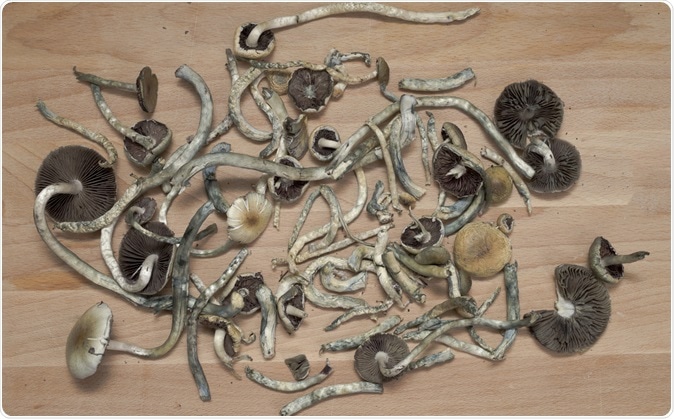A new study from UK has found efficacy of psilocybin – a chemical found in “magic mushrooms”, in severe depression. The study involved 19 patients with severe depression. The patients took the psilocybin and around half of them improved and reported maintained improvement after 5 weeks of therapy. The patients however also received psychological care along with the treatment.
The researchers were from Imperial College in London, Hammersmith Hospital, Cardiff University and University College London. The study entitled, “Psilocybin for treatment-resistant depression: fMRI-measured brain mechanisms” was published in the journal Nature Scientific Reports in its latest online issue.

Magic Mushrooms. Image Credit: Skyward Kick Productions / Shutterstock
For this study the team of researchers tried to assess if there was a benefit offered in severe depression or those with treatment-resistant-depression with psilocybin and psychological support. The mechanism by which this chemical could act is not well understood. They measured parameters in the patients’ brain including cerebral blood flow (CBF), blood oxygen-level dependent (BOLD) and resting-state functional connectivity (RSFC) using functional magnetic resonance imaging (fMRI). CBF, BOLD and RSFC were all measured before and after treatment with the chemical psilocybin. CBF or cerebral blood flow involves measurement of the amount of blood that flows around in the brain. This can predict brain activity. Resting state functional connectivity or RSFC is a measure to monitor the amount of brain activity in the nerve networks within the brain. Four areas of the brain that have been known to be associated with depression were mainly measured. In addition depressive symptoms were assessed before and after treatment. For this a questionnaire with scoring system was used. This is a standardized test called the Quick Inventory Depression Score (QIDS-SR16).
Treatment involved two doses of psilocybin given a week apart. The initial dose was 10mg of psilocybin and the second dose was 25 mg of psilocybin. Measurements of depressive symptoms and the fMRI was made one week after the second dose and then again at 5 weeks after the treatment completion. Patients were given psychological support during the period of treatment.
Results showed that there was a marked lowering of the depressive symptoms in all the 19 patients at one week after treatment. After 5 weeks, nearly half the patients (47 percent) were still low on depressive symptoms. After treatment the CBF or flow of blood to the brain’s regions including the temporal cortex and amygdala were found to be reduced. This has been associated with reduction of depressive symptoms.
Increased RSFC on the other hand meant improvement shown and maintained at 5 weeks after therapy. Among the four brain regions studied, two of the areas showed increase in RSFC and one area showed a decrease in RSFC. The connectivity was found to be unchanged in one of the regions of the brain studied. This result comes from the 15 brain scans that could be done at the end of the study. Psilocybin could thus have helped in changing the way how the network of the nerves communicate within the brain that may reduce the negative thought patterns that are associated with depression. The team called this chemical a “reset therapeutic” that can “reset” or “reboot” the brain.
This study has several limitations however, it is a small study and no patients were used as control to see whether the drug actually worked. The authors add that this is not a proven study yet and people with depression should not try “magic mushrooms” or other psychedelic drugs because of the safety concerns. Psilocybin is any case an illegal drug.
Source: https://www.nature.com/articles/s41598-017-13282-7